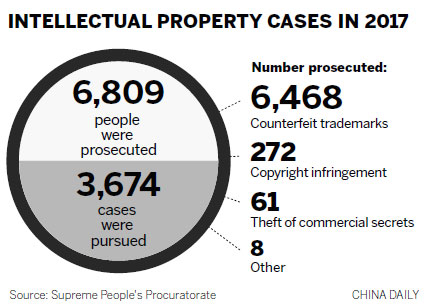Intellectual property crimes often 'hidden'


An officer displays pirated discs seized in a raid in Fuyang, Anhui province, April 23, 2018. [Photo/VCG]
Intellectual property thieves are resorting more to internet technology, including external servers and cloud platforms, to commit their crimes, which makes them harder to stop, a prosecutor at the Supreme People's Procuratorate said on Wednesday.
"These types of cases are more technical and hidden, as well as cross-regional," said Wang Wenli, the prosecutor.
Even so, prosecutions and arrests are rising. More than 6,800 people suspected of intellectual property crimes were prosecuted nationwide last year, SPP spokeswoman Xiao Wei said on Wednesday. Arrests were up by 12.5 percent over 2016, she said.
People suspected of trademark-related crimes, including the manufacture and sale of counterfeit goods, accounted for more than 90 percent of the prosecutions, Xiao said.
Some 272 people were prosecuted for copyright infringement, and 59 for theft of commercial secrets, she added.
Such secrets include computer code. Wang, the prosecutor, said that criminals often copy and issue computer software without permission.
In a case typical of those seen by the SPP, since 2015, Zong Ran and Wang Xu copied 700 written works from two Shanghai companies and a Beijing company without permission, and then stored them on a cloud server.
Zong developed a program that allowed a WeChat account to send the files stored on the cloud platform to specified email addresses.
Chen Lingjie paid Zong and Wang for the service without the three companies' permission. Chen sold activation codes on his Taobao shops.
Customers could enter the codes on Chen's WeChat accounts, and the files would be sent to their e-mail from the cloud.
Prosecutors in Beijing's Haidian district approved the arrest of the three suspects in June 2017. They were tried in court in December. Chen was sentenced to one year in prison and fined 50,000 yuan ($7,900); Zong got nine months in prison and a 10,000 yuan fine; Wang got nine months in prison and a 5,000 yuan fine.
Han Xiaofeng of the top procuratorate, said, "It is the first criminal case of copyright infringement in China that has made use of so many online services, including e-commerce, social media and the cloud platform."
"The difficulty of this case is that it involves a large amount of electronic data evidence, which is easy to revise or remove," he added.

MOST POPULAR
- 1 China to continue opening up its mega-market to world: premier
- 2 Policies concerning expats, foreign enterprises in November 2025
- 3 China to enhance convenience for inbound tourism: minister
- 4 Departure tax refund applications surge 285% as inbound tourism rebounds
- 5 China's foreign trade up 3.6% in first 11 months of 2025







